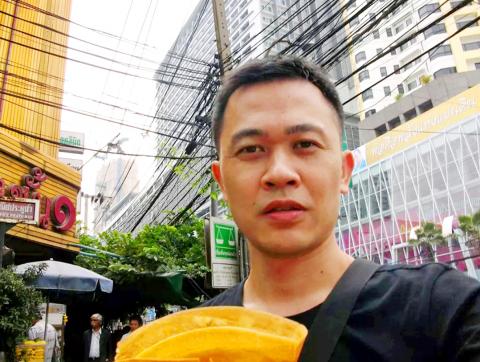Foreign media have lauded pilot Liao Chien-tsung (廖建宗) for his courageous endeavors in the final moments of TransAsia Airways Flight GE235, steering away from buildings to avoid further casualties, while comments from former pilots appear to confirm rumors that Liao told the company that there was a problem with the engines.
Flight GE235 bound for Kinmen crashed into the Keelung River on Wednesday morning about 5km out of Taipei International Airport (Songshan airport).
There were 53 passengers and 5 crew members on board.

Screen grab from Liao Chien-tsung’s Facebook account
At least 31 of the passengers have been confirmed dead and rescuers continue to scour the river for the remaining 12 passengers.
A total of 15 passengers survived, most with injuries,, while two passengers in a taxi that was hit on the bridge by the plane sustained minor injuries.
Hong Kong-based aviation analyst Daniel Tsang said: “Based on the flight path, the pilot deviated and tried to avoid obstacles. The pilot apparently made a conscious effort to avoid further and unnecessary casualties by ditching in the river. It was a very courageous move.”
Former aviation safety inspector at the US Federal Aviation Administration (FAA) David Soucie said: “Well I’ve gone through each of them [the dash-cam videos] frame by frame and as you can see … it goes out of sync meaning that the left propeller lost power ... so this movement to the left was intentional by the pilot to avoid the buildings … and to make an attempt to reduce fatalities by trying to get it onto the water and miss the obstructing bridge.”
One source said that most pilots were “trained to just continue straight, it’s the best lift and the engine will allow you to continue to travel” if they suffer a flame-out of an engine during a critical phase of flight, adding that Liao had “made that decision, a conscious decision” to steer the plane into the river.
Former US Department of Transportation Inspector General Mary Schiavo said: “He was pretty close to actually saving many more … here they would have probably made it, and many more would have survived, if that wing hadn’t dropped and they hadn’t scraped the wing.”
“Statistically speaking, just an outrageously bad safety record,” Schiavo said referring to TransAsia’s safety record, which has suffered five crashes since 1995, including TransAsia Airways Flight GE222 which crashed in Penghu in July last year, killing 48 people of the 58 on board.
Many former pilots of the ATR72-600 series said that it was possible to fly and land the plane using a single engine, which suggests a faulty engine was to blame.
Meanwhile, former Civil Aeronautics Administraton director-general Billy Chang (張國政) said that the pilot’s actions had sought to minimize damages to the ground, especially as the plane was above a densely populated region.
Taipei Mayor Ko Wen-je (柯文哲) also said that the pilot had done his best, adding that the plane crashed 50m before a utility tower holding high voltage lines, which could have caused a major blackout in Taipei.

Chinese Nationalist Party (KMT) Chairman Eric Chu (朱立倫), spokeswoman Yang Chih-yu (楊智伃) and Legislator Hsieh Lung-chieh (謝龍介) would be summoned by police for questioning for leading an illegal assembly on Thursday evening last week, Minister of the Interior Liu Shyh-fang (劉世芳) said today. The three KMT officials led an assembly outside the Taipei City Prosecutors’ Office, a restricted area where public assembly is not allowed, protesting the questioning of several KMT staff and searches of KMT headquarters and offices in a recall petition forgery case. Chu, Yang and Hsieh are all suspected of contravening the Assembly and Parade Act (集會遊行法) by holding

PRAISE: Japanese visitor Takashi Kubota said the Taiwanese temple architecture images showcased in the AI Art Gallery were the most impressive displays he saw Taiwan does not have an official pavilion at the World Expo in Osaka, Japan, because of its diplomatic predicament, but the government-backed Tech World pavilion is drawing interest with its unique recreations of works by Taiwanese artists. The pavilion features an artificial intelligence (AI)-based art gallery showcasing works of famous Taiwanese artists from the Japanese colonial period using innovative technologies. Among its main simulated displays are Eastern gouache paintings by Chen Chin (陳進), Lin Yu-shan (林玉山) and Kuo Hsueh-hu (郭雪湖), who were the three young Taiwanese painters selected for the East Asian Painting exhibition in 1927. Gouache is a water-based

Taiwan would welcome the return of Honduras as a diplomatic ally if its next president decides to make such a move, Minister of Foreign Affairs Lin Chia-lung (林佳龍) said yesterday. “Of course, we would welcome Honduras if they want to restore diplomatic ties with Taiwan after their elections,” Lin said at a meeting of the legislature’s Foreign Affairs and National Defense Committee, when asked to comment on statements made by two of the three Honduran presidential candidates during the presidential campaign in the Central American country. Taiwan is paying close attention to the region as a whole in the wake of a

OFF-TARGET: More than 30,000 participants were expected to take part in the Games next month, but only 6,550 foreign and 19,400 Taiwanese athletes have registered Taipei city councilors yesterday blasted the organizers of next month’s World Masters Games over sudden timetable and venue changes, which they said have caused thousands of participants to back out of the international sporting event, among other organizational issues. They also cited visa delays and political interference by China as reasons many foreign athletes are requesting refunds for the event, to be held from May 17 to 30. Jointly organized by the Taipei and New Taipei City governments, the games have been rocked by numerous controversies since preparations began in 2020. Taipei City Councilor Lin Yen-feng (林延鳳) said yesterday that new measures by